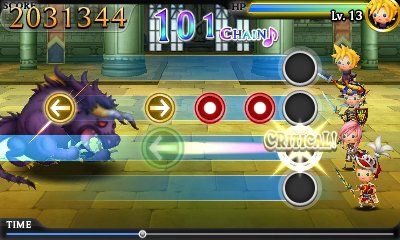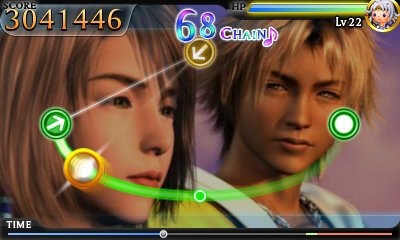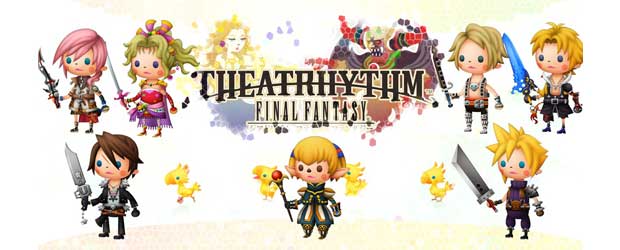GamesRadar+ Verdict
Pros
- +
Rhythm gameplay easy to grasp
- +
Contains some of the best songs in gaming history
- +
A love letter to Final Fantasy all fans will enjoy
Cons
- -
RPG elements are fairly superficial
- -
Daunting amount of things to unlock
- -
Running out of songs you havent played
Why you can trust GamesRadar+
The rhythm genre is so firmly established in gaming that it’s strange how few music games exist that pay tribute to game music. Most franchises in gaming history probably couldn’t support their own rhythm game, but Final Fantasy is one of the few that could spawn its own music title and still leave out tons of classic tracks. Timed for FF’s 25th anniversary, Theatrhythm: Final Fantasy does just that, taking dozens of songs from series history and reinterpreting them masterfully for a portable, musical adventure.
Unlike the overly serious tone of core FF titles, Theatrhythm takes advantage of the fact it’s a spin-off, celebrating the series’ history with a smattering of adorable whimsy. There’s instability between the gods Chaos and Cosmos, with Chaos attacking the Music Crystal, creating disharmony. In response Cosmos brings together heroes from all over time and space to battle this discord. Soon Final Fantasy heroes – from the first game, all the way up to FFXIII – are in the same place to make beautiful music together and save the Crystal.
But let’s not kid ourselves: the plot is pretty pointless, as the concept is purely an excuse to celebrate a quarter-century of Final Fantasy. Each numbered entry in the series has three separate songs that you play along with, tapping in time on the touch screen. The controls have a natural feel similar to the likes of Rhythm Heaven or Elite Beat Agents (if you’ve played those DS classics), so it feels right watching the top screen for visual cues while your stylus does all the work downstairs. Even if you’ve never played those games, Theatrhythm eases you into its controls effortlessly, as the game’s breezy approach to plot goes the same for how it settles you into gameplay.
Each musical tribute to a classic FF mixes up a trio of melodic minigame styles. There’s the Field Music Stages that remix and repurpose the overworld tunes from each of the games. These are the simpler tracks – you know, the ones you let slip into the background of your FF gaming time – brought to the forefront to remind you how great they truly are. The Battle Music Stages do the same for the tracks you heard in FF combat, and these tracks are engaging with quicker tempos that demand more focus. Lastly, you have Event Music Stages, medleys of some of the most memorable tracks to FF titles that play over videos of important moments (SPOILERS: Aeris dies!).
Despite using the same three input types, all three minigame modes are unique and engaging. You either tap the lower screen, hold the stylus on it for a few seconds, or swipe in up/down/right/left for Slide Triggers. Unlike other rhythm games, it doesn’t matter where you tap on the bottom screen. All you’ll need to worry about is keeping the tempo, something that’s easy to adapt to in the Basic setting, save for one minor flaw: You might be used to flicking in any direction with your stylus in other rhythm games, but Theatrhythm’s Slide Triggers need you to firmly touch the screen and slide in a specific direction. It took us several songs before we adapted to the more precise swiping input and in the more hectic songs it was still tough to remember the specific movement Slides require.

Since this is a Final Fantasy game, Square Enix gave this music game its own unique RPG touches, but most are unnecessary. You create your party of four using heroes from all 13 core FF games, all of them gaining XP and leveling up with each song. The best way this is incorporated is the slowly growing HP which allows your characters to take more damage from missed notes and “live” longer through a song. There are some items that you can equip that makes other stages easier as well, but ultimately they have little impact. You can play the whole game without ever using them and rhythm game experts will want to turn them off for a true challenge anyway. We appreciate Theatrhythm’s attempt at something new in the genre, but the RPG elements are oversimplified and too easy to ignore to count for much.
If you have even a teaspoon of rhythm in your soul, you’ll be able to breeze through the basic versions of the 50 or so songs in the main campaign in under five hours, but the game hardly ends there. Putting aside the DLC – a feature that’s virtually unheard of in a 3DS game – each track has an “Expert” and “Ultimate” mode that will keep you busy for a long time. You’ll also keep being pulled back by the huge number of unlockables and secrets hidden within, something you usually can expect from a Square Enix game. Even if you “finish” the game in a matter of hours, you’ll be returning to Theatrhythm for weeks.

Up to this point, had anyone ever though it’d be a good idea to create a rhythm game around a rich back catalog of game soundtracks? Theatrhythm: Final Fantasy proves that it’s a very good idea. Non-FF fans will still have fun tapping to the beat and experiencing some of the best music in gaming history, but this 3DS game really works best as a tribute to 25 years of amazing soundtracks. The varying levels of difficulty, heavy emphasis on fan service and inviting gameplay make Theatrhythm a great way to celebrate the franchise’s legacy.
More info
| Genre | Other Games/Compilations |
| Description | The varying levels of difficulty, heavy emphasis on fan service and inviting gameplay make Theatrhythm a great way to celebrate the franchises legacy. |
| Franchise name | Final Fantasy |
| UK franchise name | Final Fantasy |
| Platform | "3DS" |
| US censor rating | "Everyone 10+" |
| UK censor rating | "" |
| Release date | 1 January 1970 (US), 1 January 1970 (UK) |
Henry Gilbert is a former GamesRadar+ Editor, having spent seven years at the site helping to navigate our readers through the PS3 and Xbox 360 generation. Henry is now following another passion of his besides video games, working as the producer and podcast cohost of the popular Talking Simpsons and What a Cartoon podcasts.




